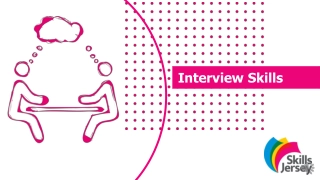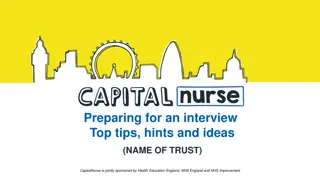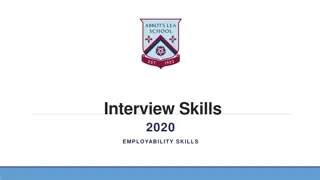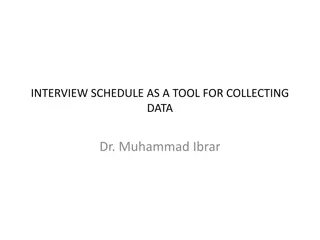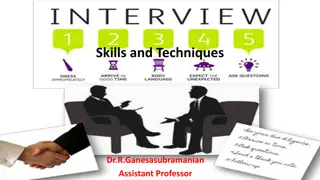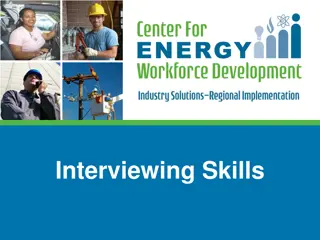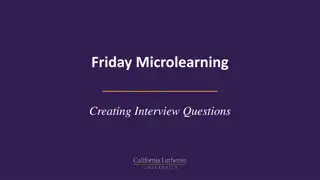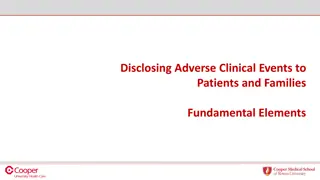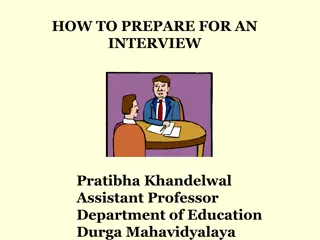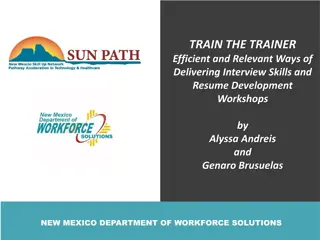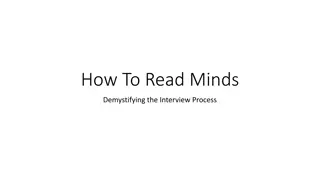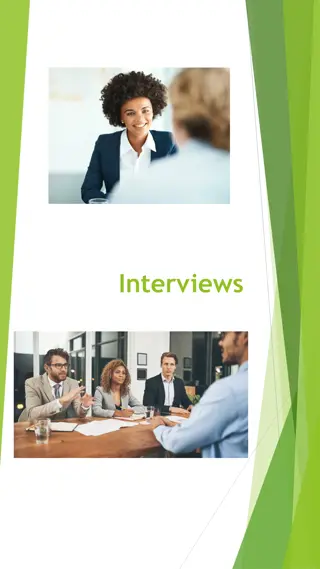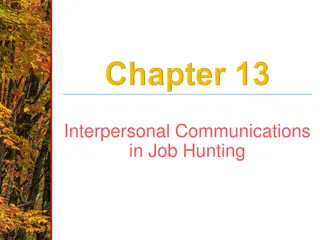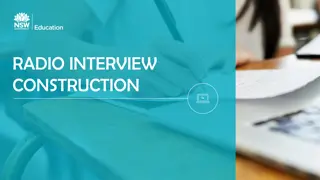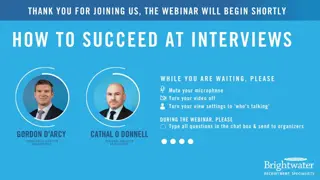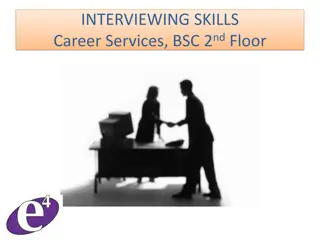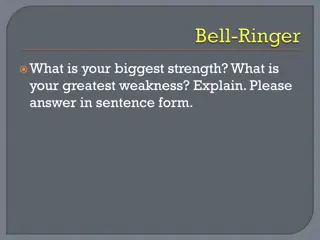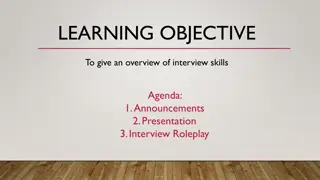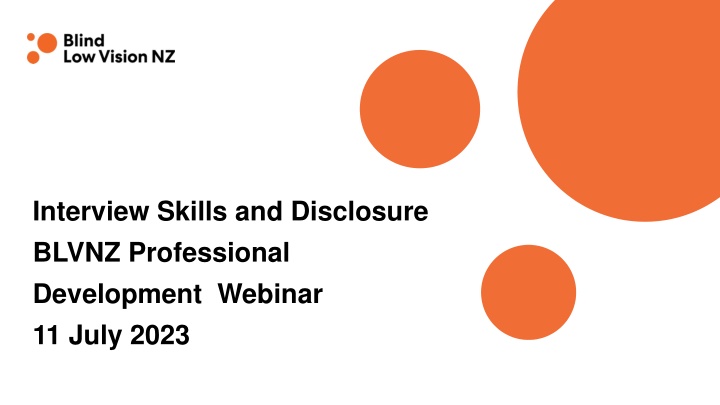
Mastering Interview Skills: Tips and Tricks for Success
Enhance your interview skills with valuable insights on different interview types, preparation strategies, and essential tips for success. Learn how to research the company, present your achievements confidently, and adapt to the evolving employment landscape. Be well-prepared, confident, and ready to shine in your next interview.
Download Presentation

Please find below an Image/Link to download the presentation.
The content on the website is provided AS IS for your information and personal use only. It may not be sold, licensed, or shared on other websites without obtaining consent from the author. If you encounter any issues during the download, it is possible that the publisher has removed the file from their server.
You are allowed to download the files provided on this website for personal or commercial use, subject to the condition that they are used lawfully. All files are the property of their respective owners.
The content on the website is provided AS IS for your information and personal use only. It may not be sold, licensed, or shared on other websites without obtaining consent from the author.
E N D
Presentation Transcript
Interview Skills and Disclosure BLVNZ Professional Development Webinar 11 July 2023
Agenda 10.00 am to 10.10 am: Housekeeping and who is in the room 10.10 am to 10.40 am: Interview Skills PowerPoint 10.40 am to 11.00 pm: Question and answer session
What is an Interview? Interviews are about putting your best foot forward and owning your achievements and experiences Most jobs have a multi-stage application process and different interviewing methods can be used throughout the process There are variety of interview methods that can be used.
Different types of interviews Telephone Interview Face-to-Face Interview Video Interview Panel Interview Assessment Centers Competency Interview Formal / Informal Interview
Preparing for your interview The number one thing is for you to believe in yourself and remember all your unique offerings there is no one else like you in the universe: Achievements Strengths Focus on what you can do Naturally resilient and innovative problem solver Don t get caught up on what you can t do This attitude will take you anywhere.
Research It is critical that you spend time researching the company and interviewers prior to your meeting: Company values Company mission Recent media articles or publicity Social responsibility/sustainability stance Who is interviewing you Specific areas of growth for the business
Tips and tricks: The employment world is changing, employers are now looking for personality as well as experience. Can you adapt? How will you fit in with the team? Are you friendly and bubbly? You can take notes into your interview if that helps Take a bottle of water into the interview If you are nervous, it is fine to let the interviewers know Take your time to answer questions it is fine to pause.
Dealing with stress Stress is a feeling of physical and emotional tension. Stress is your body s natural reaction to challenges. Use visual imagery to reduce stress Persuade yourself with positive, rational thinking Reduce the importance of the event in your mind Use progressive muscular relaxation Listen to music or relaxation apps to calm you Perform slow, deep breathing.
First impressions matter First impressions matter like nothing else! Plan the day of your interview, Personal presentation is critical Be punctual Your interview starts at the front door Receptionists are part of the interview Etiquette and body language are noted Entering the room Taking a seat
Your story Be prepared to talk about yourself for no more that two minutes. Sell yourself Where did you grow up? What did you study, and why? Your hobbies and passions Points of difference, culturally, second language Diversity Voluntary and community work Leadership opportunities and awards
Behavioral questions It s a question that requires you to draw on and describe past experiences or situations and explain how you acted in those situations. There is a knack to answering behavioral interview questions and it is important to know how to craft an answer. STAR: Situation - Statement Task Example Action Explanation Result Outcome
Behavioral questions to prepare for Here are some frequently asked questions that you can prepare for ahead of time: Teamwork and collaboration Working autonomously Problem solving Handling a challenging situation Time when you made a mistake and how you handled it Explain how you would add value to this organisation.
General questions The questions listed below are general, however it is still important that you know how to answer these: One of two of your key strengths? When are you available to start work? Preferred hours/flexible working conditions Do you require any technology or support to perform this role? What is your salary expectation? Do you have any questions? Do you have a criminal conviction?
What do you expect to be paid? This can seem like a very daunting question, and you don t want to get it wrong. Avoid saying a number outright, which could be too low or too high. A few good responses: - I expect to be remunerated appropriately for my qualifications and previous work experience. - What is the salary band for the role? - My understanding is that for a role like this, the average salary is between $x - $x. Does that align with what you re offering?
Disclosure talking about your vision loss When and how you choose to talk about your vision loss is entirely up to you. Some disabilities are obvious, many are not. Reframe what may be perceived as a weakness by others Should you be invited to talk about your vision loss this is your opportunity to turn a perceived negative into a positive Be solutions focused Be confident in your ability to do the job Be your authentic, genuine self.
Mind your language Keep your language positive Avoid phrases such as: I think, I m quite - this suggests uncertainty Be confident in your own ability If you are not confident, how can someone who doesn t know you feel confident? Do not use overly familiar language Avoid colloquialism.
After your interview Thank you Handshake offer your hand first Your interview doesn t end till you leave the building Send a follow up thank you email Not successful? Ask for feedback Successful to the next stage - If this is another interview preparation time again! Offer/Negotiation/Acceptance.
The negotiation process Once you have made it through the interview process and have been offered of the job, this is your opportunity to negotiate your terms and conditions of employment; Don t underestimate the importance of likeability Help them understand why you are worth what you are seeking Make it clear they can get you for the right offer Understand the person across the table Understand their constraints Negotiate multiple issues simultaneously Be prepared to compromise.
Actions Behaviours Point of Choice Values Attitudes Experience
Example of a bad interview https://youtu.be/VadQskWdFhc
Example of a good interview https://youtu.be/B7SoNGxJVc8

